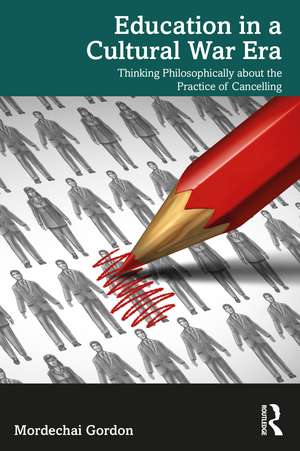Education in a Cultural War Era: Thinking Philosophically about the Practice of Cancelling
Autor Mordechai Gordonen Limba Engleză Paperback – 6 mai 2022
| Toate formatele și edițiile | Preț | Express |
|---|---|---|
| Paperback (1) | 278.61 lei 3-5 săpt. | +12.92 lei 6-10 zile |
| Taylor & Francis – 6 mai 2022 | 278.61 lei 3-5 săpt. | +12.92 lei 6-10 zile |
| Hardback (1) | 997.14 lei 6-8 săpt. | |
| Taylor & Francis – 6 mai 2022 | 997.14 lei 6-8 săpt. |
Preț: 278.61 lei
Nou
Puncte Express: 418
Preț estimativ în valută:
53.32€ • 57.90$ • 44.79£
53.32€ • 57.90$ • 44.79£
Carte disponibilă
Livrare economică 02-16 aprilie
Livrare express 18-22 martie pentru 22.91 lei
Preluare comenzi: 021 569.72.76
Specificații
ISBN-13: 9781032103655
ISBN-10: 1032103655
Pagini: 140
Dimensiuni: 152 x 229 x 16 mm
Greutate: 0.2 kg
Ediția:1
Editura: Taylor & Francis
Colecția Routledge
Locul publicării:Oxford, United Kingdom
ISBN-10: 1032103655
Pagini: 140
Dimensiuni: 152 x 229 x 16 mm
Greutate: 0.2 kg
Ediția:1
Editura: Taylor & Francis
Colecția Routledge
Locul publicării:Oxford, United Kingdom
Public țintă
Postgraduate, Undergraduate Advanced, and Undergraduate CoreNotă biografică
Mordechai Gordon is Professor of Education at Quinnipiac University, USA.
Recenzii
"This meticulously researched and thoughtfully analyzed work shows how cancel culture—mobilized at times to advance notions of social justice—can too easily become a mortal threat to democracy itself. With this smart and engaging book, Gordon joins the ranks of leading scholars willing to wade into the complexities of education in liberal democracies. I recommend cancelling your plans and settling in to read this book."
—Joel Westheimer, University Research Chair in Democracy and Education, University
of Ottawa.
"While much has been written about the political and social dimensions of ‘cancel culture’, we have few treatments of its problematic educational consequences. Mordechai Gordon has admirably filled this gap in his systematic, clearly written study. His book will spark further research and will inform current attempts to foster greater tolerance in society and education."
—David T. Hansen, Weinberg Professor in the Historical and Philosophical Foundations
of Education, Teachers College, Columbia University
"Many articles and books have documented the moral problems with cancel culture as well as its impact on individuals. In this book Dr. Gordon highlights the threat it poses to education. A liberal
education is simply not possible in an environment where one mistake can cost a career and truth seeking is not the main goal."
—Dorian Abbot, Associate Professor of Geophysical Sciences, University of Chicago
—Joel Westheimer, University Research Chair in Democracy and Education, University
of Ottawa.
"While much has been written about the political and social dimensions of ‘cancel culture’, we have few treatments of its problematic educational consequences. Mordechai Gordon has admirably filled this gap in his systematic, clearly written study. His book will spark further research and will inform current attempts to foster greater tolerance in society and education."
—David T. Hansen, Weinberg Professor in the Historical and Philosophical Foundations
of Education, Teachers College, Columbia University
"Many articles and books have documented the moral problems with cancel culture as well as its impact on individuals. In this book Dr. Gordon highlights the threat it poses to education. A liberal
education is simply not possible in an environment where one mistake can cost a career and truth seeking is not the main goal."
—Dorian Abbot, Associate Professor of Geophysical Sciences, University of Chicago
Cuprins
Introduction; 1 The Contested Debate over the Meaning and Value of Cancel Culture; 2I Socrates, Spinoza, and other Cancelled Thinkers; 3 Cancelling during the McCarthy era; 4 Philosophical Arguments against Cancelling and Restricting Speech; 5 When is Cancelling Warranted?; 6 The Educational Dangers and Risks of Cancelling; 7 Education for Open-Mindedness
Descriere
This book investigates the phenomenon of cancelling historically as well as how it became an issue recently. It presents compelling philosophical arguments against the practice of cancelling and highlights various educational dangers and risks that emerge from this practice and deserve our attention.
